
Dental implants in Midland are a costly investment. The price you pay upfront is one of the many reasons patients strive to keep their restorations in optimal condition. Designed to last decades or even a lifetime with proper care, this reality can quickly fade should you choose to continue practicing these 5 bad habits. Read on to find out what you should stop doing if you want to enjoy a healthier, more complete smile for longer.
Smoking and Using Tobacco Products
If you want to keep your immune system healthy and in optimal condition, smoking is one of the first things you should give up. Not only is it harmful to your teeth, but it can increase your risk for gum disease, which can threaten the longevity of your dental implants. Because your implants must properly fuse with the bone, smoking and tobacco use can make it difficult for the bone to attach to the post, making you more susceptible to potential implant failure.
Canceling or Avoiding the Dentist for Checkups
Keeping your gums healthy is one of the most important aspects of maintaining your dental implants. If you are not regularly seeing your dentist in Midland for checkups and cleanings, you could be facing serious problems over time. Brushing and flossing are vital, but if plaque and tartar begin to harden in areas around your gums, at-home care is no longer enough. Only professional instruments are capable of removing harmful bacteria and helping you avoid losing your implants.
Opening Packages with Your Teeth
This is one bad habit dentists would like everyone to stop, no matter if real or artificial teeth exist. Using your implants (and natural teeth) as tools opens you up to significantly damaging your smile, resulting in a trip to see your emergency dentist. Regular items like scissors, pliers, or bottle openers are designed to withstand the necessary pressure it takes to open packages, containers, and even bottles, but your teeth are not. While tooth enamel is known to be extremely durable, it can become chipped, cracked, or even break under an extreme amount of pressure. If you want to keep your implants damage-free, it’s best to take a few minutes and find the right tool for the job.
Chewing on Inanimate Objects
When sitting at your desk, do you find yourself chewing on pens or pencils? Maybe when you’re nervous you tend to bite your fingernails? Although these may be mindless habits, they can damage your implants more than you think. Chewing on inanimate objects as well as ice can leave your costly investment broken and damaged, resulting in more time and money spent to repair and/or replace your dental crown, bridge, or implant denture. But your restoration isn’t the only part of your mouth that can suffer the consequences of this bad habit. The bones surrounding your implant can also become damaged, causing your implant to loosen and even fail.
Neglecting Your At-Home Oral Hygiene Routine
When performing your oral hygiene routine at home, you may be brushing each morning and night, but are you flossing? If not, it’s time to start. Gum disease is the leading cause of implant failure. Since brushing can only clear away plaque and harmful bacteria on the surfaces of your teeth, flossing is necessary to remove particles that burrow between your teeth. If left untreated, it can spread beneath the gum line and begin attacking the tissue and bone, creating a serious problem for your implants.
By ridding these bad habits from your day-to-day lifestyle, your investment in new teeth will keep you smiling for years to come.
About the Author
Dr. Stephen Boyles graduated from Texas A&M University Baylor College of Dentistry in May 2016 before joining his father, Dr. Franklin Boyles, in his practice at Boyles General Dentistry in June 2016. As a family-operated practice, the two combine their talents to deliver exceptional dentistry to patients living in Midland and its surrounding communities. Providing patients with dental implants to replace their missing teeth, the two strive to provide individuals with the necessary tips to keep their new smiles looking and feeling good for decades or longer. If you want to learn what you can do to prevent possible damage to your implants, visit our website or call (432) 685-7011.
